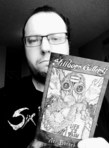Axl Barnes's Blog, page 4
November 10, 2021
Overkill (poem)
We talked and I said the same stuff as before,
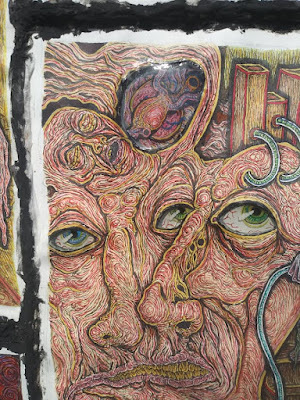 Illustration by Foul Apparatus
Illustration by Foul Apparatusand he listened patiently as if my words were new.
I felt ashamed, like a comedian
using the same material.
I meant to say, "I'm sorry my friend, I had no time;
No time for new music, movies, books,
no new words,
no good words,
no words buzzing with electricity.
And later on, I whispered to him,
in our solitude,
when whisky loosened my lips:
"We were sold for nothing, amigo,
sacrificed to a senile god,
and abortions can't even dream of orgasms.
We work here at the slaughterhouse,
Although they don't let us call it that.
We learn how to make nooses
out of umbilical cords,
and cement screaming mouths with boredom.
They even robbed us of our screams,
let alone our words.
Listen to those hammers knocking!
They're building the gallows
to hang the stillborn
who drink whisky,
and can still whisper."
September 6, 2021
Part-time Freedom
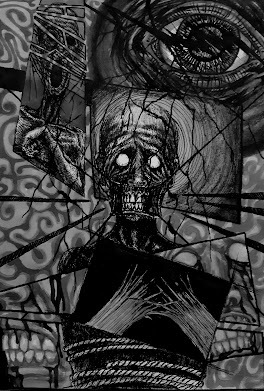 Unsafe, by
Brendan McCarthy
struggling to fly, smashing its beak against the cement, trapped between the unreachable sky and the elating torment of its memory; a swimmer with crotches instead of arms,a biker with one leg on a twisting gravel path, a jockey riding a three-legged horse into the ground.
Unsafe, by
Brendan McCarthy
struggling to fly, smashing its beak against the cement, trapped between the unreachable sky and the elating torment of its memory; a swimmer with crotches instead of arms,a biker with one leg on a twisting gravel path, a jockey riding a three-legged horse into the ground. Part-time freedom: a benchwarmer daydreaming of the melancholy cheerleader, a movie-star hopeful playing extras,wrapped in a body bag of silence,turned ghost, continuing to play.
Part-time freedom is a rotten deal, but consider the mole, the tireless burrower, digging tunnels and eating earthworms, the moles' tiny, near-blind eyes were never alloweda glimpse of the azure dome of the sky and the crumbling pillars supporting it.
August 7, 2021
Junked
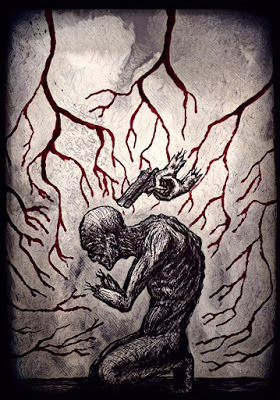 Apparent Self Inflicted by Brendan McCarthy I got down on my knees and begged him,
Apparent Self Inflicted by Brendan McCarthy I got down on my knees and begged him, my forehead touching the wooden floor.
"I have nothing left, boy," he said in a husky voice,
"my pockets are full of fog, my head is full of fog.
I'm happy I even managed to tie this knot
and put the noose around my neck.
This damn prosthetic arm is defective, you see?
When I try to move my thumb, my little finger moves,
When I want to point, my ring finger wakes,
When I want to flip someone the bird, my thumb comes to life.
Maybe I don't know how to want anymore.
I don't even remember learning to want.
It was a miracle I tied that knot, God only knows."
A deep sigh filled with shame.
"I can't help you anymore, kid,
We had a good run
but I'm at the end of my rope."
He gave a phlegmy laugh and coughed on cigarette smoke.
He was a freakish old boy learning how to count. Not getting it.
His left was waxy and flaccid from his latest stroke,
good only for lifting the cigarette to his chapped lips.
He stood with his leg stumps on the seat of the wheelchair,
rope tied to the rafters.
I pushed some more: "But we have been a good team so far,
we can keep it going,
the wind will blow in our sails again."
He shook his head in resignation and defeat. "I couldn't even if I wanted to, lad.
I don't know how to want and what to do with it, don't you see?
Don't you listen?
You never listen.
I forget.
It's all fog.
What I remember is that losing at Russian roulette is winning,
and winning is actually losing.
The empty click is losing, that's all I know."
I felt the tip of a pen writing a suicide note on my twisted face.
"Oh, don't get in a mood now, you cry-baby,
you can still see me as a ghost.
I'll be there for you till you can fend for yourself and start getting lucky."
He winked at me. His eyes were gray, cloudy, timeless.
You can find me in the empty places:
attics with dusty Christmas decorations,
January hangovers wrapped in spiderweb,
abandoned railways,
weed-choked ditches,
that place up the hill where the pine trees have shopping carts on top,
my cardboard box with its foundation of dried-up vomit
and roof made of needles, like tiny nuclear warheads.
If you follow the Tumor Constellation
you're bound to slip on my ectoplasm body on the way."
Suddenly, he pushed the chair with his stumps, fell,
his neck snapped,
My heart sunk.
His eyes were now white, milky.
It was the milk he sucked from his mother's breast, no doubt,
he was back to being a baby, a broken one,
back to a dusty womb.
Loneliness filled my mouth with sand.
It was a pipe-dream, going to chase his ghost.
Any movement, the very idea of putting one foot in front of another,
was something from the hazy past, a wild superstition.
In the future, I saw my own resting places: a padded room, a jail cell,
a green dumpster drenched in the purple twilight.
It was all foggy.
All I was certain about was the pen scrawling on my skin
and the sound of the cylinder spinning.
July 25, 2021
June 6, 2021
Anatomy of Failure
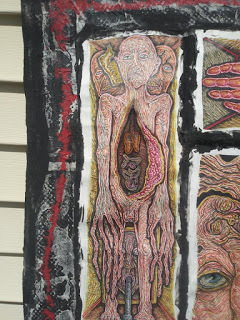 Picture by
Foul Apparatus
Picture by
Foul Apparatus
The desire coagulated into an act of will.How did this happen?What's the source of this jolt of vitalityas frenzied as a clump of cancerous cells? It was as unexpected as a slick, black sealondulating through the desert. I sliced the clot with my scalpel; From it oozed the cloudy urine of a blind beggar, the laughter of a mad clown, the acrid sweat of Sisyphus, and the milk of a zombie's eyeball. I wasn't built for success. But, on the bright side, On the path between paralysis and mummification, Between anemic wisdom and chronic illness, I managed to become a doctor performing his own autopsy.
May 21, 2021
April 14, 2021
Interview with horror writer B.R. Yeager
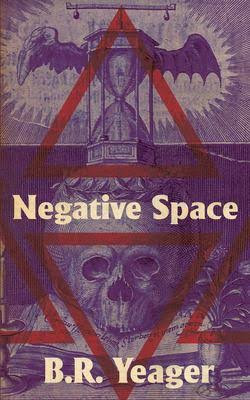 B.R. Yeager's Negative Space was a mind-blowing surprise of the same magnitude as Curtis Lawson's Black Heart Boy's Choir and Nicole Cushing's Mr. Suicide. All of these novels vividly capture teenage angst and courageously follow their characters into the mouth of madness, to the point where the cold edge of the blade cuts through tender skin. B.R. Yeager does away with the cannon of mainstream horror—the building of suspense to a climax, the protagonist vs. antagonist dichotomy, detailed analysis of the main character's motives and thinking—and reads more like the account of a collective bad trip, the chronicle of the gradual physical and psychological ruination of a group of teens in the small town of Kinsfield. From the outset, we learn that Kinsfield is plagued by a wave of teen suicides. Tyler, the main character, wants to contact the sinister supernatural forces behind that wave, with the help of hallucinogens and black magic. We only learn about Tyler through the lenses of those close to him and can only speculate about the motives behind his erratic and often self-destructive behavior. Reckless and cruel, Tyler is ready to sacrifice himself and those around him in his attempt at transcending his humanity. As with any act of hubris, Tyler is physically and spiritually mutilated by the malignant forces he summoned. The gloomy story and morbid imagery in Negative Space project a thick sense of mystery and doom similar to what you experience while watching a David Lynch film. The nightmarish dreamscapes are like the surrealist landscapes of Dali, and reflect hidden symbols and archetypes. Negative Space is a hypnotic book, with an almost subliminal rhythm and sound it calls us to explore the network of caves and catacombs below consciousness.
B.R. Yeager's Negative Space was a mind-blowing surprise of the same magnitude as Curtis Lawson's Black Heart Boy's Choir and Nicole Cushing's Mr. Suicide. All of these novels vividly capture teenage angst and courageously follow their characters into the mouth of madness, to the point where the cold edge of the blade cuts through tender skin. B.R. Yeager does away with the cannon of mainstream horror—the building of suspense to a climax, the protagonist vs. antagonist dichotomy, detailed analysis of the main character's motives and thinking—and reads more like the account of a collective bad trip, the chronicle of the gradual physical and psychological ruination of a group of teens in the small town of Kinsfield. From the outset, we learn that Kinsfield is plagued by a wave of teen suicides. Tyler, the main character, wants to contact the sinister supernatural forces behind that wave, with the help of hallucinogens and black magic. We only learn about Tyler through the lenses of those close to him and can only speculate about the motives behind his erratic and often self-destructive behavior. Reckless and cruel, Tyler is ready to sacrifice himself and those around him in his attempt at transcending his humanity. As with any act of hubris, Tyler is physically and spiritually mutilated by the malignant forces he summoned. The gloomy story and morbid imagery in Negative Space project a thick sense of mystery and doom similar to what you experience while watching a David Lynch film. The nightmarish dreamscapes are like the surrealist landscapes of Dali, and reflect hidden symbols and archetypes. Negative Space is a hypnotic book, with an almost subliminal rhythm and sound it calls us to explore the network of caves and catacombs below consciousness.Mr. Yeager was kind enough to answer some questions for my blog.
Axl: First, Mr. Yeager, congratulations on writing such an amazing novel! Although it is very stylized, the reader can guess it's partly rooted in personal experience. Can you please share with us some of the biographical sources of the novel, as well as giving us a sense of its literary influences?
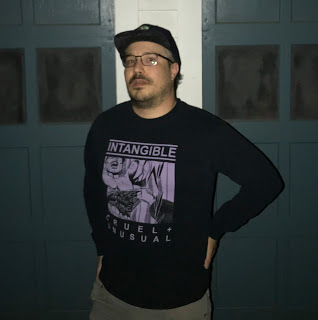
B.R. Yeager: While I would definitely agree that much of Negative Space is rooted in lived experience, it’s much more complicated than it being strictly biographical. The short version is that the book emerged in response to a close friend’s suicide. Beyond that, there are bits and pieces of experiences taken from my own life, or the lives of people I’ve known, or things I’ve observed, and integrated into the story. But ultimately, it’s all been smeared together in a way that makes it completely fictional.
Major literary influences would include Kathe Koja’s The Cipher, Ray Bradbury’s Something Wicked This Way Comes, Dennis Cooper’s My Loose Thread, Grace Krilanovich’s The Orange Eats Creeps, Philip K. Dick’s Flow My Tears, the Policeman Said, The Kybalion by Three Initiates, Blake Butler’s 300,000,000, Toni Morrison’s Beloved, Edgar Allan Poe’s “The Fall of the House of Usher,” and John Keel’s The Mothman Prophecies.
Axl: Negative Space seems to fit the subgenre of cosmic horror but at the same time is wildly transgressive and subversive in both content and structure. Where would you place it in the landscape of contemporary horror fiction?
B.R. Yeager: I have no idea. Honestly, I feel a bit out of step with—or at least not particularly knowledgeable—about the contemporary horror landscape. I tend to have a very broad and personal conception of horror as a genre, which would likely include works that many wouldn’t label as horror. Ultimately, I don’t think it’s my place to square Negative Space into any particular realm within the genre, though cosmic horror and transgressive fiction seem like appropriate tags.
Axl: In the novel, you introduce the concept of mind without life. The way I understand it, the mind emerges in the brain but it can emerge in any kind of dead matter that has a certain pattern. Is it fair to say that Tyler dies but also preserves his consciousness? Can we still say that he's alive, but more like an astral body?
B.R. Yeager: I’m becoming more and more hesitant to answer any clarifying questions about the text, not to be an asshole, but mainly because I think any answers I give will be infinitely less interesting than the questions being posed. I will say that this interpretation is a valid one.
Axl: As a Satanic hero or anti-hero, Tyler seems consumed by the desire for power and control. Is it fair to say that he was used and then discarded by the higher negative force engulfing the town of Kinsfield? Also, did you focus on a group of teenagers because teens are more receptive to the actions of supernatural forces?
B.R. Yeager: I think you’re correct in that Tyler is more a conduit than an original agitator. I’m not sure I would go as far as to say he was being used by the higher forces at play, as that implies those forces possess a somewhat anthropomorphic will, which I’m not entirely sure is the case. I’d say it’s more akin to a large stone placed in the middle of a stream. The stone diverts the water, but the water is not aware of this action, nor is the water aware of this change (as far as we know). But I could be wrong. (I realize this uncertainty on my part may seem strange. But with this book I wanted to write about the Unknown, and in order to truly do so, it was essential that I kept myself in the dark regarding the inhuman forces at play).
There were two main reasons I focused on teens. The first was that I wanted to write a horror novel in the tradition of “kids on bikes uncover nefarious forces,” i.e. Stephen King’s IT, or the film The Gate, etc. The second (and more practical) reason is that there has been far less drama and “excitement” (if one could call it that) in my adult life than there was in my teens and early 20s. By making the main characters teens, I had more experiences worth drawing from, in terms of drama.
Axl: While the novel avoids a standard good vs. evil plot, and there are lots of gray areas, Tyler seems to be at the darker end of the spectrum and Lu at the lighter end. There's also a distinction between the moths and wasps that accompany a nefarious act and the bees that are present when something "positive" takes place. Can you comment a bit about the mythological symbolism of these insects or what made you use them?
B.R. Yeager: I’m genuinely not sure I can speak to the insects’ relation to broader mythologies. Ultimately, I think these insects are very personal manifestations of aspects of the characters who invoke them. In the book, I did want the divine or the beyond to be accessible through a number of methods and ritual, not a single dogmatic practice, as I believe this to true in reality. As a result, all the magickal or spiritual practices occurring in the book are very personal in nature, and outside of a dogmatic framework or formal institutions.
Axl: What are your writing plans for 2021?
B.R. Yeager: Right now I’m co-writing a low-budget horror film directed by Nick Verdi (https://twitter.com/Verdi___Nick) that I’m very excited about. I don’t think I can say much now, but I feel like it’s in a similar vein of a lot of great low-budget debuts, like Abel Ferrera’s The Driller Killer, or Wes Craven’s Last House on the Left, or Gaspar Noe’s I Stand Alone.
I also have a short story in Hymns of Abomination, which is a forthcoming anthology tribute to Matthew Bartlett, published by Silent Motorist Media. Bartlett is from my hometown, and primarily writes about a fictionalized version of it, so it was fun to play with that world. I’m also in the early stages of my next novel, but that’s likely 3-5 years away.
Follow B.R. Yeager on Twitter @BRYeager
January 24, 2021
Interview with horror writer Curtis Lawson
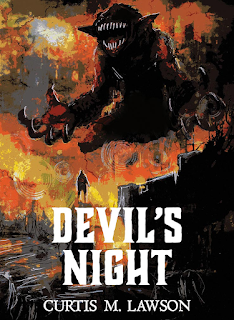 Illustrator Luke Spooner from
Carrion House
I've first encountered Curtis Lawson's fiction last year and was blown away by his novel
Black Heart Boys' Choir.
Lucien Beaumont, the main character, is a musical prodigy who discovers an unfinished song composed by his dead father. Obsessed with completing the song Lucien starts playing a damnation game with the demon Amduscias. I think of this novel as a perfect work, like Athens coming out whole from Zeus' forehead. Lawson's style carries a mathematical beauty and elegance, but at the same time is visceral and emotionally dizzying. When Lawson started promoting his new book,
Devil's Night
, the title shot up to the top of my TBR list. Devil's Night is a collection of horror stories centered around the legend that every year, the night before Holloween, Detroit, the Motor City, becomes possessed by demonic forces of chaos and destruction. The book is a rocking eruption of original writing fuelled by a devilish imagination. I'd compare it with classics like Clive Barker's Books of Blood or Stephen King's Night Shift as well as more recent works like Joe Hills's 20th Century Ghosts. Curtis was kind enough to answer some questions about his new book and his writing plans.
Illustrator Luke Spooner from
Carrion House
I've first encountered Curtis Lawson's fiction last year and was blown away by his novel
Black Heart Boys' Choir.
Lucien Beaumont, the main character, is a musical prodigy who discovers an unfinished song composed by his dead father. Obsessed with completing the song Lucien starts playing a damnation game with the demon Amduscias. I think of this novel as a perfect work, like Athens coming out whole from Zeus' forehead. Lawson's style carries a mathematical beauty and elegance, but at the same time is visceral and emotionally dizzying. When Lawson started promoting his new book,
Devil's Night
, the title shot up to the top of my TBR list. Devil's Night is a collection of horror stories centered around the legend that every year, the night before Holloween, Detroit, the Motor City, becomes possessed by demonic forces of chaos and destruction. The book is a rocking eruption of original writing fuelled by a devilish imagination. I'd compare it with classics like Clive Barker's Books of Blood or Stephen King's Night Shift as well as more recent works like Joe Hills's 20th Century Ghosts. Curtis was kind enough to answer some questions about his new book and his writing plans. Axl: On social media, you mentioned Sin City and The Crow as inspirations for Devil's Night. What other books or movies inspired you? And what makes Devil's Night stand out?
Curtis: One of the things I wanted to do with Devil’s Night was explore several different types of horror stories while keeping them tied together in theme and with a loosely connected narrative. The idea for having the stories loosely connect definitely stems from Sin City, but the individual stories all draw from different inspirations.
80’s horror films were a big influence, No One Leaves The Buther Shopbeing the most notable example of that. Through Hell for One Kiss draws heavily from The Crow. I pretty much lifted the structure of Trashfire Stories from a Batman animated short.
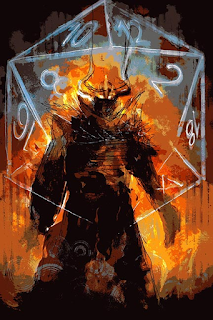
The biggest influence outside of Sin City is probably The Willowsby Algernon Blackwood. I wanted to make the environment itself antagonistic, and The Willows is the most exceptional example of that kind of thing that I can think of. The Graveyard of Charles Robert Swede is a direct homage to The Willows.
I suppose I probably drew on IT in regards to creating my version of Detroit. King’s town of Derry is a character in and of itself and I find it to be the best part of the book.
What makes it different? I think the shared lore and the way in which the stories are woven together makes it stand out from a lot of other short story collections. If I did my job right, the stories also present important questions and shine a light on sensitive issues without judgment or bullshit platitudes. I find it the job of the writer to get people to think, but never tell them what to think.
Axl: In Hideaway Dean Koontz describes Vassago as a rebellious teen whose dark mind attracts a demon, resulting in demon possession. In Black Heart Boys’ Choir, we have more of a collaboration or pact between Lucien and the demon Amduscias. In Devil's Night, it seems that most characters are trapped by an inescapable demonic force. How do you see, in general, the relation between demonic forces and a character's will? Does the character still exercise any free will?
Curtis: I suppose it depends on the story. Koontz clearly intended for his demon to be a real thing, so I think Vassago had less free will. It’s been a long time since I revisited Hideaway, so I can’t speak with strong authority on that.
The dynamic between Lucien and Amduscias in Black Heart Boys’ Choir is different. I leave it intentionally ambiguous as to if the demon is real, but beyond that, even if the reader decides that Amduscias is real in story terms, the character is still a symbol of Lucien’s obsessions, resentments, and trauma.
I suppose there is a question of free will there, but it’s more of a battle between Lucien’s ID (Amduscias) and his ego (Lucien himself). The lack of an avatar for his superego represents how he was failed by society and his parents. That moral compass is simply absent.
I tried to show that by having the adults fail him in some large or small way in each encounter. That’s also why there is no direct dialog from Lucien’s mother and why she pretty much stays hidden away in her room for the entire book.
Axl: Black Heart Boys’ Choir seems rooted in your personal experiences as an artist struggling for aesthetic perfection. Are some stories in Devil's Nightalso inspired by personal experiences?
Curtis: Black Heart Boys’ Choirwas the most deeply personal thing I’ve ever written. That book was very emotionally autobiographical, and a few of the scenes mirror actual events from my childhood. It was cathartic to write, but it was also emotionally exhausting.
Devil’s Night was a nice change of pace because I wasn’t as intimately attached to the stories.
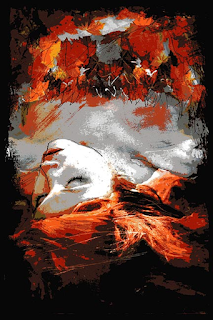
D20 is inspired by some childhood friends who grew up in a similar situation to the boys in that story. Breaking Wheel captures my yearning to escape the shitty neighborhoods I lived in and to build a new life away from all that. A Night of Art and Excess ties into the unearned sense of elitism I felt as a teenager– the belief that I was destined for and entitled to bigger and better things and that the world just didn’t understand.
Those are probably the most personal stories. The rest are just made up of insights and fantasies.
Axl: Stories like Fire Sermon, This City Needs Jesus, An Angel in Amber Leaves, or The Exorcism of Detroit, Michigan seem to convey an anti-Christian message in the sense that those who want to carry out the work of God seem themselves evil, and angels become demons. But at the same time, a lot of Christian imagery is employed in describing the Devil's Night as a night when the gates of Hell are open. So, I wonder, if you strip away the Christian outlook, what's bad about the Devil's Night. And in what sense does it belong to the devil?
Curtis: I don’t think I did any of that intentionally… or I guess I wasn’t consciously thinking “Let’s demonize religion.” That being said, I’ve never had much love for the Abrahamic faiths. That shines through in a lot of my work, perhaps to my detriment at times.
As I enter middle-age I’ve grown more tolerant of religion and have even found some allegorical value in Abrahamic myths that I used to abhor, but I think I’ll always have a bit of a chip on my shoulder in that regard.
That being said, I want to express that my problems with religion don’t necessarily extend to the religious. I actually find it quite unfortunate how chic it is to mock people for their belief in God or their adherence to religious tradition.
As for Devil’s Night, I think it is a little glimpse into a much more literal hell than the apostles or Dante ever show us. Have you ever known a really messed up person? A hard drug addict or a career criminal? For people like that every moment is hell because their minds are a minefield of insecurity, resentment, and rage. The real Devil’s Night was an expression of that. It’s the personal hell inside of hundreds of people bleeding into the real world in a tangible way.
Axl: What are your plans for 2021?
Curtis: I have three short stories scheduled to be published, one in the second issue of S. T. Joshi’s Penumbra journal. I’ll also be publishing a new Adze (a character introduced in Devil’s Night) short story each month via my Patreon page.
For bigger projects, I’m working on a novella for a shared universe project that I can’t really talk about, but that I am extremely excited for. I will say that I get to share a pretty exclusive TOC with a few of my favorite authors. I actually have this huge case of impostor syndrome going into the project, but I hope it gives me a chance to prove that I belong there.
I’ll also be writing my next novel for Weird House Press which is my first deep dive into the Lovecraft Mythos. I’ve been reluctant to play in that sandbox given my deep love for it, but I think I have something interesting to bring to the party.
You can order Devil's Night here: https://www.weirdhousepress.com/product/devils-night/
You can find Curtis Lawson on Twitter @c_lawson
Instagram @curtismlawson
Facebook @curtismlawson
September 22, 2020
Interview with horror writer Nicole Cushing
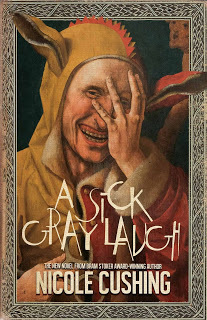 Nicole Cushing's novel A Sick Gray Laugh has hit me with the force of a revelation. Recipient of the prestigious Bram Stoker award, Cushing transgresses the boundaries of the horror genre, moving seamlessly between history, philosophy, satire, and nightmarish grotesquery. The novel is thought-provoking and emotionally dizzying. Written in a funny, lighthearted tone, A Sick Gray Laugh has a gloomy, eerie undertone that, coupled with the creepy, outlandish visuals, will haunt the reader long after finishing. The author was kind enough to take the time and answer some of the main questions I have about her novel, but before we get to that I'll offer a brief outline. Noelle Cashman, the main character, decides to write a book about "the overwhelming Grayness that's slathered over everything like a thick coat of snot." Grayness is a soul-crushing disease that affects many small towns, and Noelle is able to establish that the source of the infection is the town of Naumpton, Indiana. Digging into its history, Noelle discovers two utopian cults that settled in the area but were ultimately crushed by civilization. The leader of the first cult was known as The New Moses and preached a synthesis between Christian principles and those of industrial capitalism. Basically, The New Moses claimed that if infused with the divine spirit of moral joy, factory workers and their employers would live in perfect harmony. One necessary step toward achieving this state of bliss was that all members of the cult were to cover their faces with black veils, symbolizing ego death, and their absolute submission to God. The second cult was The Brides of the Holy Ghost who, under the influence of local Evelyn Wilson aka The Great Prophetess, come to believe that sordid Naumpton is the place of birth of the Antichrist and, hating both men and sex, were able to temporarily turn the struggling town into a matriarchy. Studying these two cults, Noelle deduces some of the principles of fighting Grayness. Grayness means order and civilization and should be countered with chaos and madness. Grayness is conformity and coagulation and should be countered with rebellion and separation. Animated by the aggressive weirdness of the two pioneering cults Noelle decides to form her own cult of misfits, built around female supremacy, chaos, and the Principle of Separation.
Nicole Cushing's novel A Sick Gray Laugh has hit me with the force of a revelation. Recipient of the prestigious Bram Stoker award, Cushing transgresses the boundaries of the horror genre, moving seamlessly between history, philosophy, satire, and nightmarish grotesquery. The novel is thought-provoking and emotionally dizzying. Written in a funny, lighthearted tone, A Sick Gray Laugh has a gloomy, eerie undertone that, coupled with the creepy, outlandish visuals, will haunt the reader long after finishing. The author was kind enough to take the time and answer some of the main questions I have about her novel, but before we get to that I'll offer a brief outline. Noelle Cashman, the main character, decides to write a book about "the overwhelming Grayness that's slathered over everything like a thick coat of snot." Grayness is a soul-crushing disease that affects many small towns, and Noelle is able to establish that the source of the infection is the town of Naumpton, Indiana. Digging into its history, Noelle discovers two utopian cults that settled in the area but were ultimately crushed by civilization. The leader of the first cult was known as The New Moses and preached a synthesis between Christian principles and those of industrial capitalism. Basically, The New Moses claimed that if infused with the divine spirit of moral joy, factory workers and their employers would live in perfect harmony. One necessary step toward achieving this state of bliss was that all members of the cult were to cover their faces with black veils, symbolizing ego death, and their absolute submission to God. The second cult was The Brides of the Holy Ghost who, under the influence of local Evelyn Wilson aka The Great Prophetess, come to believe that sordid Naumpton is the place of birth of the Antichrist and, hating both men and sex, were able to temporarily turn the struggling town into a matriarchy. Studying these two cults, Noelle deduces some of the principles of fighting Grayness. Grayness means order and civilization and should be countered with chaos and madness. Grayness is conformity and coagulation and should be countered with rebellion and separation. Animated by the aggressive weirdness of the two pioneering cults Noelle decides to form her own cult of misfits, built around female supremacy, chaos, and the Principle of Separation. Axl: Stephen King famously said, "I recognize terror as the finest emotion and so I will try to terrorize the reader. But if I find that I cannot terrify, I will try to horrify, and if I find that I cannot horrify, I'll go for the gross-out. I'm not proud." "A Sick Gray Laugh" doesn't fit neatly into the mold of mainstream horror; there are no monsters (human or inhuman) and almost no gore. How would you describe your brand of horror in relation to King's dictum and more established subgenres like body horror, cosmic horror, psychological horror and so on?
Nicole: You're correct when you point out that my characters don't struggle against traditional antagonists. They struggle against the menacing, palpable atmosphere around them. They struggle against reality. Each realizes they’re a part of a vast, hideous machine, and they struggle against that machine. Often, they struggle against their own brains. Therefore, I don't think King's taxonomy is all that helpful when applied to my work. Instead, I would describe my work as a variety of weird fiction, because weird fiction often depicts an alienated individual’s struggle against their surroundings, or against reality.
However, even that label may confuse the issue. So often, when someone says “weird fiction” they really mean “cosmic horror” or “Lovecraftian fiction” or “Ligottian fiction”. They use “weird fiction” to refer exclusively to the Anglo-American tradition of cosmic horror, as articulated in short stories. I feel a stronger connection to the Continental European tradition of the weird, and to a couple of weird works from the Middle East and North Africa. Moreover, I feel connected to the tradition of the weird novel. Right now, I’m not interested in short stories.
Don’t get me wrong, I continue to respect and admire the work of Thomas Ligotti. But if you study his work and read his interviews, you soon realize he’s influenced not only by Anglo-American Lovecraftian fiction, but also by the global weird tradition. Upon exploring the international influences mentioned in his interviews I got hooked on them, myself! Therefore, Ligotti has been my “gateway drug” to the global weird tradition (and translated fiction, in general). For me, Ligotti’s work isn’t the final destination of the weird. It’s not a destination at all, but rather a door. And doors are meant to be walked through.
That’s how literature advances. We stand on the shoulders of giants, yes. But we don’t stand on the shoulders of giants so we can look down at the giants. We stand on the shoulders of giants so we can better reach the next frontier.
My work follows in the tradition of novels like The Tenant by Roland Topor and The Unbearable Lightness of Being by Milan Kundera. I’m also influenced by novellas like The Blind Owl by Sadegh Hedayat, The Hospital by Ahmed Bouanani, The Great Shadow by Mário de Sá-Carneiro, and The Seven Who Were Hanged and The Red Laugh by Leonid Andreyev. Most recently, I’ve been influenced by the novels of Witold Gombrowicz. His work exerted a strong influence on A Sick Gray Laugh.
Lest I seem unpatriotic, I should mention that I feel a kinship with some American weird novelists, too. Shirley Jackson and Caitlin Kiernan, in particular. But neither Ms. Jackson nor Ms. Kiernan weave absurdity into their work. You couldn’t call either of them “playful”. I, on the other hand, revel in gallows humor, and I see writing as a combination of self-discipline and play.
Axl: "A Sick Gray Laugh" features elements of both postmodernism and existentialism. Metanaration and irony are blended with more sombre reflections about the human condition, mental illness, and existential dread. What are your thoughts on mixing these two traditions?
Nicole: I don’t want to quibble too much with your question, but I’m not sure “existentialism” is quite the right label. For me, the phrase “existentialist fiction” conjures up images of Sartre and Camus and Simone de Beauvoir. It implies fiction that advocates for existentialist values. Didactic fiction. That’s not what I’m about. I’m not cheerleading for any particular system of thought.
But I get the gist of what you’re asking, and I can only say that the use of metanarrative and irony to address serious literary subjects is a very old trick. In the 1930s, Gombrowicz pulled it off in his novel Ferdydurke. Kundera’s novels do something similar, although his irony is more muted than that of Gombrowicz. It’s less nightmarishly absurd. One could argue that it goes back much further. Kundera, for example, claims Cervantes and Rabelais as influences. When it comes to matters of style and tone, my work isn’t really experimental. Or perhaps it is experimental, but only in the sense that I’m replicating an experiment that’s been performed many times before. Perhaps my only stylistic innovation is carrying that tradition forward into the realm of twenty-first century weird fiction, spiking it with a shot glass of transgression, and imposing it on a cast of working-class characters scrabbling together lives in the American Midwest.
Axl: Noelle Cashman, the hero (or anti-hero) of the novel, is a self-professed nihilist, fan of the work of Thomas Liggotti. She claims all beliefs are ridiculous and warns us against Moronic Hope. And yet, she's very determined to fight Grayness. What's the point of that fight? What is she trying to defend? Wouldn't a pessimist like Liggotti say that the whole world is Gray; that there's no exit? That maybe even Colors are Gray? Doesn't her ambition to destroy Grayness turn Noelle into an optimist? And doesn't her commitment to things Colorful and The Principle of Separation betray the fact she's still a victim of grandiose narratives and Moronic Hope?
Nicole: It’s been a while since my brain was fully marinated in A Sick Gray Laugh. (It’s now fully marinated in my work-in-progress.) But, if I recall correctly, Noelle’s quest is a quest for psychological comfort, above all else. That’s what she’s trying to defend (or, at least, obtain). She’s suffocated, in a psychological sense, and she wants to breathe.
The fact that she makes an effort to breathe doesn’t really indicate that she’s an optimist. At least, not a capital-O, philosophical Optimist. She’s merely succumbing to the same reflex any suffocated individual feels: the reflex to fight for air.
But, for the sake of argument, let’s assume that you’re correct: she’s an optimist, of sorts. If this is the case, she’s a terrifying optimist, a sadistic optimist, the kind of optimist who is a walking advertisement for pessimism!
But shouldn’t I be bothered that Noelle contradicts herself? I don’t believe this is a problem because Noelle admits as much. She tells the reader, directly, that she finds it impossible to stay committed to any belief. Her mind is hideously mutable. Her brain is like a kaleidoscope, with one important difference. Instead of constantly changing into various neat and tidy geometrical patterns, it changes into a series of monstrous, foul, asymmetrical blobs.
Axl: Early on, Noelle discovers that The New Moses and his utopian cult use black veils to cover their faces upon their arrival in the New World. To them, face-covering is a means of erasing the ego and ushering in the Utopia of selfless moral joy. Later in the story, Noelle realizes that when wearing her balaclava she has the power to part the Gray Sea just as the original Moses parted the Red Sea. Does this power have to do with suppressing the ego like in the case of the New Moses? And, more generally, what is the role of Noelle's ego in her fight against Grayness. As a wannabe cult leader, she must be prideful and arrogant, which is also what separates her from the conformity of Grayness? Yet, at the same time, her ego must be deemed fluid and illusory by her commitment to nihilism and the unreality of everything. What are your thoughts on this dilemma?
Nicole: There’s a lot to unpack here. Let’s take the questions one at a time.
Does Noelle’s power to part the Gray Sea derive from suppressing her ego? No. It stems from her “re-enactment” (for lack of a better word) of something Colorful.
What’s the role of Noelle’s ego in her fight against Grayness? Noelle’s sense of self is unstable, bordering on nonexistent. However, her suffering is a very idiosyncratic sort of suffering, the type of suffering that separates her from the rest of humanity (who don’t notice, or at least don’t obsess overGrayness). Her suffering seems distinctly her own. Thus, her suffering seems to confirm her selfhood. If Noelle herself were here to speak to you, she might paraphrase Descartes and say “I suffer, therefore I am”.
Is this a dilemma? I’m not one hundred percent sure. I would call it a complication or a paradox. I try to honestly depict life, and the experience of consciousness in particular. There’s no way to take on those subjects without encountering paradoxes. In many ways, the paradox is the point. I’m not giving the reader a puzzle to solve, or a philosophy to evaluate. I’m giving the reader an experience to be felt and an aesthetic to appreciate.
Axl: Do you think Satan, as depicted let's say in Milton's Paradise Lost, as the rebel and opposer, would be an agent of Color and Chaos on Noelle's view. Can her outlook be described as essentially Satanic?
Nicole: I’ve not yet read Paradise Lost (though the Norton critical edition is in my to-be-read pile). That caveat aside, I think that even rebellion can be Gray, if it allows itself to become too predictably rebellious. Kneejerk rebelliousness can quickly turn into a dull, tiresome affectation. Only a thin line separates an opposer from a poser.
So I don’t think her outlook can be seen as Satanic. A static Satan is a Gray Satan. For Satan to truly be Colorful, he would need to rebel against himselffrom time to time.
Follow Nicole on Twitter @nicolecushing and Facebook Nicole Cushing.
July 12, 2020
Numbskull (short story)
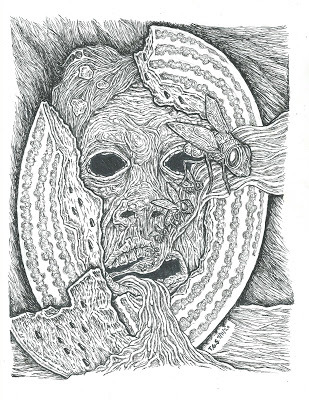 Picture by
FOUL APPARATUS
Picture by
FOUL APPARATUS
With a murderous look, Ricky watched the new kid texting. Kids these days had no sense of responsibility, on the clock and still glued to their phones. Even more revolting, the spoiled brat was sitting on the chair at the desk in the cut fruit area, like he owned the place, headphones in his ears, head bobbing in the rhythm of some infernal music. Ricky made a mental note to talk to the store manager and make sure the kid didn't pass probation. He stormed through the stockroom's swinging doors and saw Brian out on the floor, working the wet rack. With his unusual gait—hunched back and tilted to the right—Ricky approached his older co-worker. "The new kid is beyond useless," Ricky barked.Brian turned slowly and looked at Ricky with a mixture of pity and anxiety. The younger man was a bit too agitated for his taste. On Brian's view, Ricky, aka Rocky Balboa or The Rock, had been bullied as a kid and the extreme abuse jagged his brain into thinking he was a tough guy, an invincible hero. To those willing to listen to his bullshit, Ricky would brag that, despite his skinny build and small stature, he never lost a fight. Like Bruce Lee, he'd take on adversaries double his size and blindside them with his speed and the wrestling techniques he'd learned from decades of watching WWE (which he still thought was for real). Most co-workers felt sorry for him and, behind his back, they called him The Pebble, The Rock's younger and lesser-known brother. Brian said, "What did you expect? Millennials...Good thing we're still here to keep this store afloat." He then threw a rusty lettuce into the garbage box on his cart."If it was up to me I'd rip his head off and shit down his neck, I'd break his face and kick his teeth out," Ricky hissed."Well, it's a good thing it's not up to you then," Brian replied, tired of Ricky's outbursts and need for posturing. With a nervous gesture, Ricky adjusted the bill of his Oilers cap. "So, how was your vacation?""Too short," Brian replied promptly. He actually had no clear recollection of it, like a forgotten dream. Only the store seemed real, the produce department. "Did you hear what happened here, did you watch the news?" Ricky asked."No, what happened?""Oh, my God, Brian, you do live under a rock. There was a fucking massacre here last Wednesday, murder-suicide, blood everywhere, the thing was all over the news!"Brian bulged his normally sleepy eyes, his heart beating a tad faster."You remember Dylan from groceries?" Ricky continued. "He was in a relationship with Susan from deli and then she dumped him for Kevin in pharmacy?"Brian nodded despite the fact none of those names rang any bells. "So, the cunt...not only did she dump poor Dylan but she started telling people that Kevin fucks her so much better than Dylan ever did. That Kevin showed her what sex is all about. And then guys started poking fun at Dylan and he took a vacation. But he stopped by last Wednesday, carrying a butcher knife."Brian's jaw dropped, his eyes ready to pop.Ricky continued excitedly. "I was here in produce when I heard the shouts and the screams coming from pharmacy. When I got there Dylan was on top of Kevin, stabbing him." Ricky made chopping motions with his right hand. "Blood flew everywhere. Susan jumped on Dylan to stop him but he punched her away, got up, grabbed her hair, and slashed her throat. Then, he threw her on the floor and looked around wild-eyed. A crowd had formed but no one made a move. I knew he was gonna run for the exit so I ran ahead to block it and called 911. He came running down an aisle, heading for the doors but when he saw me he stopped dead in his tracks. I took out my produce knife and said 'Dylan, stop right there! The police are on their way. This is the end of the line for you buddy, you're trapped.' And you know what the crazy guy did?"Brian shook his head, his jowls trembling."He cut his fucking throat, right then and there." Ricky ran his thumb across his neck and rolled his eyes up. "Some blood splashed my face and the till #1, and the floor. It was like in one of those Tarantino movies, Kill Bill or shit like that. I think he knew if he came at me I would have killed him. We were friends but that Dylan was gone and what I was facing was a homicidal maniac. He knew better than to attack me so he killed his sorry ass." Brian knew that Ricky might have embellished the story to make himself look good, but didn't doubt the gist of it. "That's what they call a crime of passion if I'm not mistaken.""Yeah, or Small Dick Syndrome," Ricky said and laughed displaying his yellow horse teeth. "Wow, I can't believe that happened in our store.""Yes, the police were here and reporters, it was a fucking zoo. I was interviewed as a witness and was on the 6 o'clock news that day." The Pebble's fifteen minutes of fame, Brian thought. Then he prodded Ricky for more details but his interest dwindled slowly as he didn't seem to remember the people involved in this tragedy and couldn't imagine what consequences this disturbing event would have on his life in particular. It was like watching the news, a story sparks one's curiosity but it's promptly forgotten once the sports segment comes on. As if the event happened in China or the dark side of the moon.Ricky's attention was caught by a hooded woman carrying a "Good Life" gym bag and rushing toward the meat department. "I think I know her, the low-life came to steal again," Ricky said through clenched teeth and trotted to the far corner of the produce area, a hunter chasing his prey. The Pebble liked to pretend he was the Loss Prevention Officer, catch thieves, and hopefully beat them up or make them cry. Brian turned his attention back to the wet rack and started filling up the green onions, cutting their ends neatly with scissors. He noticed that the display stand for onions was almost empty and his heart leaped with joy as filling up onions was the favorite part of his shift. That and doing some "sampling" of new products after lunch.Brian was slowly getting into his groove when Ricky came back. "Did you see the God-awful Oilers last night? God, why they transfer Lucic Stone Hands is beyond me. God...is he useless or what?"Always down for talking hockey, Brian said, "Well, let me ask you this? Was Gretsky ever in a fight?"Ricky scratched his head, lifting his cap. He didn't remember much about the Great One as he wasn't from Edmonton and back in those days, when puberty hit, all he could think about was the Undertaker and the mystery of sex. "No?" he answered uncertainly."Well, of course not. Because he had his body-guard Dave Semenko. You always need a big body to protect your best player and scorer, which is McDavid now." "But he's not scoring" Ricky whined."Well, that's because his line sucks, and I don't mean only Lucic. Let me ask you this, if they put their best players on McDavid's line, you think he's gonna have more points? Of course, he will. And the other lines just have one job: to keep the puck out of the net. Then we'll win every game cause the McDavid line will score each and every game."Ricky didn't know what to make of Brian's theory and just walked away mumbling that the Oilers are going to miss the playoffs again. Back to his cart, Ricky began filling the banana stand.Turning back to his work, Brian considered that he never told Ricky that he rarely watched a game from beginning to end anymore. It was shameful, but it was part of his new outlook on life, his small secret about happiness. Brian would usually fall asleep after the first period of a hockey game. It was more the waiting for the game that gave him pleasure, the fact that the game was there, crowning his day, something to look forward to. It was some kind of ritual, him sitting on the couch, his dog sleeping on his feet and drooling on his slippers, the odorous shadow that was his wife yapping away on the phone in the kitchen, some fat singer belting out O Canada, the dimmed lights covering the room in a soft, warm amber glow. It was his end of the day ritual. Brian discovered the purpose of his life was sleeping. Just like some people lived to eat, Brian lived to sleep. He liked to eat too, naturally, as he couldn't fall asleep on an empty stomach. The trick was to treat being awake as just a means toward falling asleep. That was, working at tiring himself so that the nightly sweet surrender to the care-free void of deep slumber would come easily and without trouble. Exhausting himself, that was the key to happiness. After more than forty years of working for the same grocery store, for the most part in produce, Brian knew almost exactly the number of actions he needed to perform to get tired enough for his eight hours of bliss. Around the time he turned fifty, Brian realized there was nothing to be gained in this world. His life was like a movie unfolding in front of him, more or less independent of his wills and wants. Just a boring old movie. Every day, same shit, different pile. He was like a lonely spectator in the private cinema of his mind, and the good thing about that cinema was that it came with comfy seats in which he could snooze to his heart's desire. And no one kicked homunculus-Brian out of his own cinema. After his revelation, Brian decided that he and his wife, lovingly nicknamed Saggy Naggy, should sleep on separate beds and in separate rooms. Soon after Brian fully discovered the joys of sleep, away from Saggy Naggy's farts, her incessant grinding of teeth and lazy, slobbering blow-jobs. That had been by far the best decision of his life. Brian guessed that everyone knew, deep down, that life was all about sleep, but they were too arrogant to accept the simple truth. Ricky, for instance, was only getting into fights in the hope of getting knocked out or put out of his misery. In his mind, the half-wit thought he was a hero but all he craved was to be nothing, a hero wanting to be zero. The same with sex and drugs. The post-coitus sleep was the sweetest and overdoses were exceedingly attractive because they offered sleep plus the tantalizing chance of never waking up. While philosophizing on the miracle of sleep, Brian continued working the wet rack with expert hands; filling up celery bunches, celery sticks, cauliflower, radishes, broccoli bunches and crowns, green, yellow and red bell peppers, and carrots. Culling and rotating, trimming and throwing away the wilted, spoiled veggies, cutting away the brown stuff. Making sure that everything looked fresh and colorful. The rack underneath the vegetables was black and the rule was that no black ought to be visible. No holes. The customer's eye had to be attracted by a wall of vibrant colors. Brian was going through the same motions he has done for about four decades since he was sixteen and his dad threw him out of the house for smoking pot and sleeping with "girlfriends" who came too often and too loud. That was a lifetime ago, Brian mused, and it felt like those things had happened to someone else. Lately, it seemed to Brian, even his present life appeared to be someone else's. He felt no responsibility for his actions and no intimate connection to them. His life was like working the wet rack, purely habit, Brian was going doing it robotically. The saying went, idle hands are the devil's hands. His hands never belonged to the devil, Brian was certain of that. But who did they belong to then? For a very long time, Brian would have proclaimed that his hands were his own. But in the new reality-is-but-a-boring-movie world, doubt started to seep into the foundation of that proclamation. Those weren't his hands but just some hands, belonging to God or to his boss, Brian didn't care much which. He only cared that if those hands stayed busy, he would get tired, sleepy. Once he finished the rack, Brian went on his lunch break. Ricky's cart was still not fully worked, two full boxes of bananas waiting to be put away. The numbskull was complaining about the new kid but he wasn't doing much work either, Brian thought with a pang of annoyance. He figured he was telling his heroic story to his crush in deli or kissing the ass of some manager. During his break, Brian had the pizza and chicken-wings leftover from last night and read the sports section. The lunchroom was empty. Back in produce, he felt like having a treat and remembered the bin full of watermelon they had received that day. He decided to "sample" one with Ricky. The younger man was still not in sight but Brian figured he would show up sooner or later. He entered the stockroom, picked a watermelon, knocked on it to make sure it was ripe, peeled of its label, and set it on a table in the cut fruit area. The new kid was already gone, good riddance. Brian grabbed a big knife and began cutting the melon down the middle. Under the rind, the knife hit something hard. Puzzled, Brian cut sideways. What the gash revealed made him lurch. Under the watermelon's skin, there was a layer of yellow skin and bone. His knife had slashed into flesh that was now oozing rusty blood. The blood reeked. Despite himself, Brian continued to cut the watermelon skin like an archeologist carefully unearthing an ancient artifact. Soon there was no doubt, a human head was buried inside the fruit. He pressed on the eye socket and his finger went through. A violent stench of excrement assaulted his nostrils and he puked in his mouth, bits of barbecue chicken wings imbibed in bile. He swallowed back with a grimace. How can this be? Brian's mind reeled, struggling to find purchase. Could a murderer grow a watermelon around a human head, to hide it? Was the farmer who sold this some sort of serial killer? Were the other watermelons in the bin filled with other human body parts? A fruit naturally growing like that would violate a law of nature, surely. Breaking his stream of thought, some flies came out of the hole buzzing and Brian recoiled in disgust, letting go of the skull. For a brief moment, he thought the spoiled melon would roll over and spill its fetid content on the white, spotless table, but it remained in a vertical position, starring at him through its empty socket like an ancient totem. In a dazed rush, Brian opened a plastic bag, tossed the head and the skin of the watermelon inside and dumped the bag in the big garbage bin. Then he washed his hands, put new plastic gloves on, filled his cart with twenty-five-pound bags of onions, and went out on the floor. However, even the ritual of peeling onions couldn't eclipse the troubling image in his head. Now, as he touched every onion he imagined a small skull inside it. Could it be newborn heads? The heads of pets? Or shrunk heads? He remembered members of some ancient tribes would shrink the heads of their enemies to stave off revenge. Maybe the softer onions covered the still-forming skulls of fetuses? Maybe the moldy ones were the stillborn ones? Just as he was thinking that he felt his fingers pierce through a rotted bulb. He opened the bag and saw the grey gelatinous onion and some white spots on it. At first, he thought they were just mold or, more implausibly, bits of rice. But then he noticed the bits moving slowly, and realized they were maggots. And next to the spoiled onion, there was a set of dentures. They looked a lot like Saggy Nagy's. Brian was also vaguely reminded of the Cheshire cat, except these dentures were grinning and grinding on dry rusty onion leaves.As fast as he could, Brian took the cart in the back and threw the bag of onions away in the large garbage bin on top of the melon skull. He was freaked out and his heart was thundering in his chest, palms sweating, mind foggy from anxiety. He needed Ricky, he needed to hear his stupid stories, he needed to talk to him about hockey, anything to forget the uncanny visions. He needed things to get back to normal, not agitated, how could he sleep when agitated? Brian peered down each aisle—coffee and tea, snacks and pop, pet food, frozen foods—but Ricky was nowhere to be found. The whole store was deserted and eerily quiet. Brian figured he mistakenly stayed past closing time. He frowned and tried to think back on his actions. Suddenly, all the lights dimmed, amplifying Brian's confusion. He turned in place looking for someone, anyone, to ask for clarification. "Hello!" he shouted with an unsteady voice. "Ricky, where the hell are you?" No answer.There were no cashiers, no courtesy clerks, no customers. Through the murky light, he saw the two glowing exit lights on top of the automatic doors and an ad with the price of unleaded gas at the station next door. Outside, the lamps cast a pale light over the empty parking lot. At this late hour of the night, no doubt the doors were closed. Out of ideas, Brian appeared like a puppet with its strings cut off. He just stood there, at the entrance to the bakery area, for a good five minutes, three hundred pounds of human meat devoid of purpose. Slowly, his anxiety dissipated, the dimmed lights sedating his system. He imagined he was in the living room waiting for the angel of sleep to take him. There was some weird, upsetting horror movie on TV but he was getting tired and that was all that mattered. The reassuring fantasy took hold as the store was a familiar place, kinda like home, it was his place. He decided to look for Ricky in the stock-room. On leaden legs, he walked there, the thickening grayness around him heavier and heavier. Ricky's cart was no longer on the floor, and the banana table was finally full. The idiot must be in the back. Brian opened the doors and saw Ricky by the shelves full of banana boxes. Mr. Rocky Balboa was sleeping on the bottom side of the cart, in a fetal position, his head on a five-pound bag of potatoes. But how is this possible? Brian asked himself. Ricky was short but was he that short? Brian approached the cart and crouched down for a closer inspection. His knees popped loudly. Even through the murky light, from close-up, it looked like it was only Ricky's clothes carefully arranged at the bottom of the cart to look like a human body. This reminded Brian vaguely of a documentary about the infamous escapees from Alcatraz, who tricked their guards by leaving behind dummies in their beds to cover their break-out. For a brief second, Brian thought he was maybe the butt of a practical joke and looked around, an embarrassed smile on his face. But everything was still, no one was laughing at him. Brian turned his attention to Ricky's clothes: scuffed up black shoes, black jeans (although the company policy required dress pants), grey shirt, and green apron with the name tag. Brian lifted the Oilers cap. Underneath there was a large, wrinkled potato with a dusty, rough texture. Five white sprouts came out of the tuber, four of them looking like the tiny limbs of a fetus. On what appeared to be a bulbous head, the left eye was gone and the right one looked like a small bag of puss. The nose was sucked inside and only a couple of teeth remained sticking out. The fifth wormy sprout ran from the top of the fetus' head to the bag of Russets like an atrophied umbilical cord. Except it was the bag that seemed to suck the nutrients out of the fetus-like potato, small globs of matter passing from the decaying potato into the bag. Brian detected a sound coming from the remains of Ricky, a low voice under a layer of radio static noise. He moved his head so that his good left ear could decipher the words: "I took out... my produce knife and said 'Dylan, stop right there! The police are on their way. This is the end of the line for you buddy, you're trapped.... I'll cut you up, man. I'll cut you up you, scum...closed casket funeral when I'm done with you, you psycho." Brian covered his metamorphosed co-worker with the Oilers hat and stood up. He wasn't shocked by the horrific visage. His exhaustion covered him like a cloak, his eyelids were heavy and everything was too distant and insignificant. Reality was at the other end of the tunnel, a mess that had nothing to do with him, a boat that has left the shore. Nothing could disturb Brian now, his brain was numb, tired of processing the external world. Inside that numbskull, homunculus-Brian was almost asleep in his private theatre. With zombie-like slowness, Brian grabbed a piece of cardboard and put it on the top side of the cart and used a bag of potatoes for a pillow. He'd bunk with Ricky tonight just as he'd bunked with his brother when they were kids. His heavy lids closed and he was immediately transported into an underground world of rest and blessed, fertile rot.

